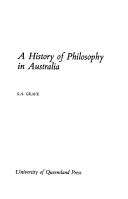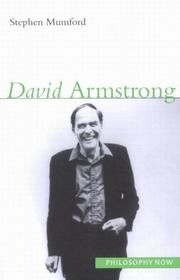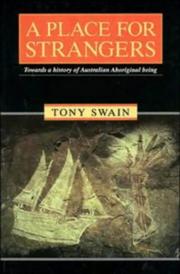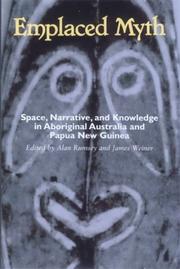| Listing 1 - 10 of 10 |
Sort by
|

ISBN: 0702216976 Year: 1984 Publisher: Saint Lucia University of Queensland Press
Abstract | Keywords | Export | Availability | Bookmark
 Loading...
Loading...Choose an application
- Reference Manager
- EndNote
- RefWorks (Direct export to RefWorks)
Book
ISBN: 0199750742 9780199750740 9780195084337 0195084330 Year: 2010 Publisher: Oxford New York
Abstract | Keywords | Export | Availability | Bookmark
 Loading...
Loading...Choose an application
- Reference Manager
- EndNote
- RefWorks (Direct export to RefWorks)
This volume brings together fourteen major essays by one of contemporary philosophy's most challenging thinkers. Huw Price links themes from Quine, Carnap, Wittgenstein and Rorty, to craft a powerful critique of contemporary naturalistic metaphysics. He offers a new positive program for philosophy, cast from a pragmatist mold.
Philosophy, Australian. --- Philosophy, Modern --- Australian philosophy
Book
ISBN: 9780195084337 0195084330 Year: 2010 Publisher: Oxford: Oxford university press,
Abstract | Keywords | Export | Availability | Bookmark
 Loading...
Loading...Choose an application
- Reference Manager
- EndNote
- RefWorks (Direct export to RefWorks)
This volume brings together fourteen major essays on truth, naturalism, expressivism and representationalism, by one of contemporary philosophy's most challenging thinkers. Huw Price weaves together Quinean minimalism about truth, Carnapian deflationism about metaphysics, Wittgensteinian pluralism about the functions of declarative language, and Rortyian skepticism about representation to craft a powerful and sustained critique of contemporary naturalistic metaphysics. In its place, he offers us not nonnaturalistic metaphysics, or philosophical quietism, but a new positive program for philosophy, cast from a pragmatist mold. This collection will be essential reading for anyone interested naturalism, pragmatism, truth, expressivism, pluralism and representationalism, or in deep questions about the direction and foundations of contemporary philosophy. It will be especially important to practitioners of analytic metaphysics, if they wish to confront the presuppositions of their own discipline. Price recommends a modest explanatory naturalism, in the sense of Hume: naturalism about own linguistic behavior, regarded as a behavior of natural creatures in a natural environment. He shows how this viewpoint privileges use and function over truth and reference, and expression over representation, as useful theoretical categories for the core philosophical project; and thereby undermines the semantic presuppositions of contemporary analytic metaphysics. At the same time, it offers an attractive resolution of the so-called "placement problems", that so preoccupy metaphysical naturalists-a global expressivism, with affinities both to the more local expressivism of writers such as Blackburn and Gibbard, and to Brandom's global inferentialism.
Philosophy, Australian. --- Philosophy, Modern --- Philosophie australienne --- Philosophie --- Philosophy of nature --- Metaphysics --- Theory of knowledge --- Philosophy, Australian --- Philosophy, Modern - 20th century
Book
ISBN: 9400769571 9400769598 1785396234 940076958X Year: 2014 Publisher: Dordrecht : Springer Netherlands : Imprint: Springer,
Abstract | Keywords | Export | Availability | Bookmark
 Loading...
Loading...Choose an application
- Reference Manager
- EndNote
- RefWorks (Direct export to RefWorks)
The History of Philosophy in Australia and New Zealand is a comprehensive account of the historical development of philosophy in Australia and New Zealand, from the establishment of the first Philosophy Chair in Australasia in 1886 at the University of Melbourne to the current burgeoning of Australasian philosophy. The work is divided into two broad sections, the first providing an account of significant developments and events during various periods in the history of Australasian philosophy, and the second focusing on ideas and theories that have been influential in various disciplines within Australasian philosophy. The work consists of chapters contributed by various philosophers, on specific fields of inquiry or historical periods within Australasian philosophy.
Philosophy. --- Metaphysics. --- History of Philosophy. --- Philosophy, general. --- Philosophy (General). --- God --- Ontology --- Philosophy --- Philosophy of mind --- Philosophy, New Zealand --- Philosophy, Australian --- Philosophy, Australian. --- History. --- Mental philosophy --- Humanities
Book
ISBN: 9782711616275 2711616274 Year: 2004 Volume: Hors série Publisher: Paris: Vrin,
Abstract | Keywords | Export | Availability | Bookmark
 Loading...
Loading...Choose an application
- Reference Manager
- EndNote
- RefWorks (Direct export to RefWorks)
Ce volume présente une approche de la métaphysique analytique dans sa variante naturaliste. Après des siècles d'éclipse, une filiation aristotélicienne retrouve ses droits légitimes en partie grâce à l'École Australienne de philosophie. Plusieurs de ses représentants éminents ont été ici réunis, dont le plus connu est David M. Armstrong. La discussion entamée à Grenoble dresse un état provisoire de l'enquête centrée sur quelques topiques : celle des vérifacteurs, des états de choses, des lois de la nature, de la causalité, des dispositions, du statut des relations, des énoncés contrefactuels, des identités primitives et de la ressemblance. Le débat engagé dispute d'une position prise à l'égard du monde qui ne suppose, ni une " idée " de la nature, ni un horizon egocentré par l'être-au-monde, ni une " construction " logique de ce dernier. Les objets, les propriétés et les états de choses sont trois manières d'envisager que ce monde, s'il a une unité spéculative, doit être structuré " dans " les éléments qui le constituent. La " bifurcation " de Whitehead entre une nature pour l'esprit et une nature qui ne dépend pas de nous, est ramenée à une sorte de convergence, puisque l'on peut admettre que l'esprit fasse lui aussi partie de la nature. Le naturalisme, à la différence du physicalisme, pense devoir cette prétention avouable au choix des outils ontologiques traditionnels que sont les universaux et les particuliers, entre lesquels se glissent désormais les tropes, nouveaux venus de cette constellation. La majeure partie de ces textes, présentés ici en version française, est encore inédite en anglais.
Philosophie analytique --- Métaphysique --- Monde (philosophie) --- Philosophy, Australian --- Philosophie australienne --- Metaphysics --- Philosophy, Modern --- Philosophie --- Métaphysique --- Analysis (Philosophy) --- Métaphysique.

ISBN: 1315711877 1317493257 1844653005 9786612534515 1282534513 9781844653003 9780773533301 0773533303 9781317493259 1844651002 9781844651009 1844650995 9781844650996 9781844651009 1844651002 9780773533318 0773533311 1317493249 9781317493242 9781315711874 6612534516 9781282534513 Year: 2007 Publisher: Stocksfield: Acumen,
Abstract | Keywords | Export | Availability | Bookmark
 Loading...
Loading...Choose an application
- Reference Manager
- EndNote
- RefWorks (Direct export to RefWorks)
David (D. M.) Armstrong is one of Australias greatest philosophers. His chief philosophical achievement has been the development of a core metaphysical programme, embracing the topics of universals, laws, modality and facts: a naturalistic metaphysics, consistent with a scientific view of the natural world. In this book Stephen Mumford offers an introduction to the full range of Armstrongs thought. Beginning with a discussion of Armstongs naturalism, his most general commitment, and his realism about universals, Mumford then examines Armstrong's theories of laws, modality and dispositions, which make up the basics of his core theory. With this in place, Mumford explores his ideas on perception, mind and belief before returning to metaphysics in the final chapters, looking at truth and the new view of instantiation. The book is a dispassionate, fair and unbiased account of Armstrongs thought. Although Armstongs is a body of work that Mumford regards highly and of real significance, he nevertheless highlights areas of weakness and issues about which there is room for further debate.
Philosophy --- Armstrong, D. M. --- Mental philosophy --- Humanities --- Armstrong, David Malet --- Armstrong, David M. --- Philosophy, Australian --- Philosophie australienne --- Philosophy, Australian. --- Criticism and interpretation. --- Australian philosophy --- Philosophy - Criticism and interpretation --- Metaphysics --- Philosophy of mind --- Armstrong, David Malet, - 1926 --- -Philosophy, Australian --- -Philosophy --- Armstrong, David Malet, - 1926-
Book
ISBN: 1282190504 9786612190506 1443806641 9781443806640 1847183786 9781847183781 9781282190504 6612190507 Year: 2007 Publisher: Newcastle Cambridge Scholars Pub.
Abstract | Keywords | Export | Availability | Bookmark
 Loading...
Loading...Choose an application
- Reference Manager
- EndNote
- RefWorks (Direct export to RefWorks)
In the age of the war on terror and what one critic has called 'disaster capitalism', the topic of trauma has assumed renewed cultural relevance. Trauma, Historicity, Philosophy is a collection of essays by Australian philosophers, psychoanalysts, and cu
Psychic trauma --- Philosophy, Australian --- Psychoanalysis --- Psychology --- Psychology, Pathological --- Australian philosophy --- Emotional trauma --- Injuries, Psychic --- Psychic injuries --- Trauma, Emotional --- Trauma, Psychic --- Social aspects

ISBN: 0511552173 0521430054 0521446910 Year: 1993 Publisher: Cambridge : Cambridge University Press,
Abstract | Keywords | Export | Availability | Bookmark
 Loading...
Loading...Choose an application
- Reference Manager
- EndNote
- RefWorks (Direct export to RefWorks)
Many of the elements ascribed to traditional Aboriginal beliefs and practices are the result of contact with external peoples - Melanesians and Indonesians, as well as Europeans. This controversial and provocative 1993 book is a detailed and continent-wide study of the impact of outsiders on Australian Aboriginal world-views. The author separates out a common core of religious beliefs which reflect the precontact spirituality of Australian Aborigines. This book investigates Aboriginal myth, ritual, cosmology and philosophy, and also examines social organisation, subsistence patterns and cultural change. It will be of great interest to readers in anthropology, religious studies, comparative philosophy and Aboriginal studies.
Aboriginal Australians. --- Philosophy, Aboriginal Australian. --- Aboriginal Australians --- Aboriginals, Australian --- Aborigines, Australian --- Australian aboriginal people --- Australian aboriginals --- Australian aborigines --- Australians, Aboriginal --- Australians, Native (Aboriginal Australians) --- Native Australians (Aboriginal Australians) --- Ethnology --- Indigenous peoples --- Aboriginal Australian philosophy --- Philosophy, Australian aboriginal --- Foreign influences. --- Religion. --- Social Sciences --- Sociology

ISBN: 0824816633 1929431007 0824823893 0824843940 Year: 2001 Publisher: Honolulu : University of Hawaiʻi Press,
Abstract | Keywords | Export | Availability | Bookmark
 Loading...
Loading...Choose an application
- Reference Manager
- EndNote
- RefWorks (Direct export to RefWorks)
S11/0705 --- S11/0700 --- S11/0610 --- Papuans --- -Philosophy, Papuan --- Sacred space --- -Sacred space --- -Aboriginal Australians --- -Philosophy, Aboriginal Australian --- Aboriginal Australian philosophy --- Philosophy, Australian aboriginal --- Aboriginals, Australian --- Aborigines, Australian --- Australian aboriginal people --- Australian aboriginals --- Australian aborigines --- Australians, Aboriginal --- Australians, Native (Aboriginal Australians) --- Native Australians (Aboriginal Australians) --- Ethnology --- Indigenous peoples --- Holy places --- Places, Sacred --- Sacred places --- Sacred sites --- Sacred spaces --- Sites, Sacred --- Space, Sacred --- Holy, The --- Religion and geography --- Papuan philosophy --- Melanesians --- China: Social sciences--Clan and family: since 1949 --- China: Social sciences--Clan and family: general and before 1949 (incl. names, clan rules) --- China: Social sciences--Marriage --- Land tenure --- Philosophy, Papuan --- Philosophy, Aboriginal Australian --- Aboriginal Australians
Book
ISBN: 9781409455967 9781315262116 9781351957069 9781138247734 Year: 2014 Publisher: Aldershot [etc.] Ashgate
Abstract | Keywords | Export | Availability | Bookmark
 Loading...
Loading...Choose an application
- Reference Manager
- EndNote
- RefWorks (Direct export to RefWorks)
Art, Aboriginal Australian. --- Indigenous art --- Aboriginal Australians --- Indigenous peoples --- Postcolonialism and the arts --- Art australien (aborigène) --- Art autochtone --- Australiens (Aborigènes) --- Autochtones --- Postcolonialisme et arts --- Colonization --- Colonisation --- Art --- Colonisation. Decolonisation --- anno 1800-1899 --- Australia --- Aboriginal Australian artists --- Art, Aboriginal Australian --- Philosophy, Aboriginal Australian --- Arts and postcolonialism --- Arts --- Aboriginal Australian philosophy --- Philosophy, Australian aboriginal --- Aboriginal peoples --- Aborigines --- Adivasis --- Indigenous populations --- Native peoples --- Native races --- Ethnology --- Ethnic art --- Art, Australian aboriginal --- Aboriginal Australian art --- Aboriginals, Australian --- Aborigines, Australian --- Australian aboriginal people --- Australian aboriginals --- Australian aborigines --- Australians, Aboriginal --- Australians, Native (Aboriginal Australians) --- Native Australians (Aboriginal Australians) --- Artists, Australian aboriginal --- Attitudes --- Colonization.
| Listing 1 - 10 of 10 |
Sort by
|

 Search
Search Feedback
Feedback About UniCat
About UniCat  Help
Help News
News